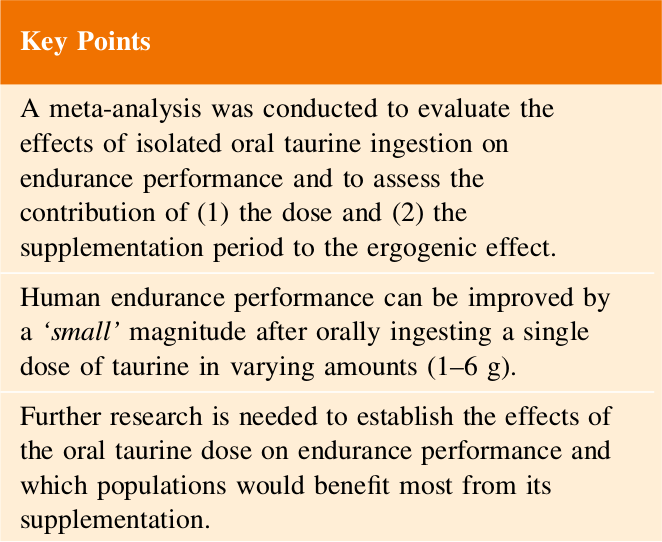
International Journal of Sport Nutrition and Exercise Metabolism, 20(4), 322-329. The effect of acute taurine ingestion on endurance performance and metabolism in well-trained cyclists. Role of taurine supplementation to prevent exercise-induced oxidative stress in healthy young men.
Zhang, M., Izumi, I., Kagamimori, S., Sokejima, S., Yamagami, T., Liu, Z., & Qi, B. The cytoprotective role of taurine in exercise-induced muscle injury. Dawson Jr, R., Biasetti, M., Messina, S., & Dominy, J. The effect of taurine depletion on the contractile properties and fatigue in fast-twitch skeletal muscle of the mouse. A taurine and caffeine-containing drink stimulates cognitive performance and well-being. Seidl, R., Peyrl, A., Nicham, R., & Hauser, E. Advances in Experimental Medicine and Biology Taurine 8, 407-425. Taurine Regulation of Blood Pressure and Vasoactivity. E., Okeke, E., Yan, X., Sidime, F., & Neuwirth, L. Treatment of hypertension with oral taurine: experimental and clinical studies. Beneficial effects of taurine on serum lipids in overweight or obese non-diabetic subjects. This product is not intended to diagnose, treat, cure, or prevent any disease. *These statements have not been evaluated by the Food and Drug Administration. This can potentially negate any positive effects taurine might have on your exercise performance. Just be aware that energy drinks are often high in calories and sugar, and the high amount of caffeine in most energy drinks may disrupt your sleep schedule. It can be taken on its own as a supplement, or more commonly, as part of an energy drink. Taurine is considered safe with doses up to 3,000 milligrams per day. While taurine can help support some aspects of overall health, its value as a performance-enhancing supplement is less convincing.* Endurance athletes, or anyone who does a lot of steady-state cardio, may benefit from taurine's ability to burn fat instead of carbs, but strength or power athletes aren't likely to see a difference in their workout from taurine alone. Other studies suggest that taurine supplementation may improve reaction time, mood, and mental focus, as well as improve aerobic endurance, increase maximum speed, and reduce perception of fatigue.* However, the taurine supplement used in these studies also contained caffeine, making it unclear to what extent taurine alone was responsible for these improvements. This is good news because fats are a more efficient form of energy than carbs, and the average person has a nearly limitless supply (roughly 100,000 calories) of fat stored in their bodies. Along with other healthy life changes, may help overweight individuals lose weight*Ī study of endurance athletes showed that cyclists who supplemented with taurine burned more fat than carbohydrates to fuel their ride. Aids in fat mobilization and oxidation*. Reduces exercise-induced oxidative damage*. May support healthy blood pressure values already within a normal range*. May support healthy cholesterol levels already within a normal range*. As a conditionally essential nutrient, taurine has several important preventive medical applications.If you're a vegetarian or vegan and not getting these daily amounts, you may want to consider a taurine supplement for its role in supporting heart health, brain and muscle function, and fat metabolism.* In this context, taurine's interaction with other nutrients, biochemicals, and xenobiotics warrants extensive exploration. 
Recent discoveries concerning taurine's role in cellular proliferation and membrane protection underscore its physiological significance. Further studies are required before taurine can be routinely advocated for use in these and other disorders. Preliminary evidence suggests a possible role for taurine administration in congestive heart disease, acute hepatitis, cystic fibrosis, and myotonia. A milder form of this condition has been observed in children on long-term total parenteral nutrition. Retinal dysfunction occurs in taurine-deficient animals. Accordingly, proprietary milk formulas are now supplemented with taurine. Although taurine is synthesized from sulfur-containing amino acids, concern has been expressed about the adequacy of endogenous sources, especially in neonates. With the exception of cow's milk, taurine is widely distributed in foods from many animal, but not plant, sources.

Taurine (2-aminoethanesulfonic acid), well known for its role in bile salt synthesis, is also involved in a number of crucial physiological processes including modulation of calcium flux and neuronal excitability, osmoregulation, detoxification, and membrane stabilization.






 0 kommentar(er)
0 kommentar(er)
